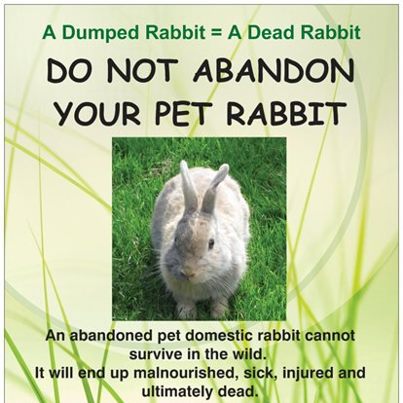Rescuers offer ailing rabbits hope
August 24, 2012 Matthew Hoekstra, Richmond Review
Rescuers found Chiquita on the grounds of Richmond City Hall in rough shape. As an abandoned pet, the rabbit had been forced to fend for itself.
Chiquita was skin and bones and suffering from infections, blindness in one eye, abscesses and a large internal mass. She was booked for surgery by generous local veterinarian Dr. Joseph Martinez, but during surgery it became clear its body had been overtaken by cancer. Chiquita had to be euthanized.
“This is what happens to pet rabbits that are abandoned. They either die on the street or end up in a terrible state like Chiquita,” said Cindy Howard. “The only good thing is that Chiquita spent her last few days on earth being loved and cared for rather than suffering and dying alone on the street.”
Howard is co-founder of Bandaids for Bunnies, a Richmond rabbit rescue organization that has launched a new poster and online campaign—No Rabbit Left Behind—to stem the tide of abandoned bunnies. The group aims to raise public awareness of the issue and ultimately secure a sanctuary for rabbits like Chiquita.
Abandoned pet rabbits roam throughout Richmond, especially hotspots like Minoru Park and the Richmond Auto Mall. A ban on the retail sale of rabbits implemented by Richmond council in April 2010 might have lessened populations, but bunnies aren’t hard to find in pet stores elsewhere in Metro Vancouver, and the animals are still pervasive on the local landscape.
Local rescuers have even found them in less-than-pastoral locations, including the Quintet construction site and on a hotel rooftop patio. “Once you start looking for them, all of a sudden (you realize) they’re everywhere,” said Howard.
Bandaids for
Bunnies concentrates its rescue efforts on rabbits suffering from injury or
illness. Co-founder Krystal Grimm, a veterinarian’s assistant, offers shelter to
the animals that, once rehabilitated with help from Dr. Martinez of Little Paws
Animal Clinic, are offered up for adoption. 
The group believes a sanctuary—which could only be built with community and government support—would not only offer safe homes for street rabbits, but serve as an educational facility allowing visitors to appreciate how domestic bunnies are ill-equipped to survive in the wild. A sanctuary would also promote spaying and neutering.
“Some people are dumping because they think they’re freeing the rabbits, and they’re giving them a better life, which they’re not,” said Howard. Rabbits, she said, are territorial, and new rabbits trying to make a home in the same area can lead to bunny conflict. “We have a couple rabbits with such severe injuries: they’re missing ears, pieces of their face are missing—just because of the other rabbits, not necessarily another predator.”
The city’s shelter is also home to abandoned rabbits, which are available for adoption, but the No. 5 Road facility has limited room. For more information about Bandaids for Bunnies and rabbits available for adoption, visit bandaidsforbunnies.com.